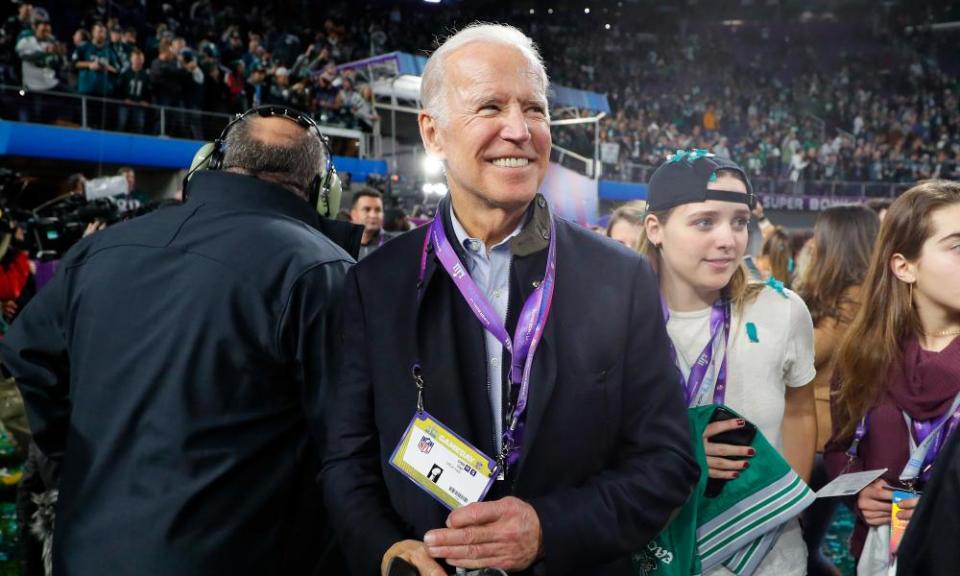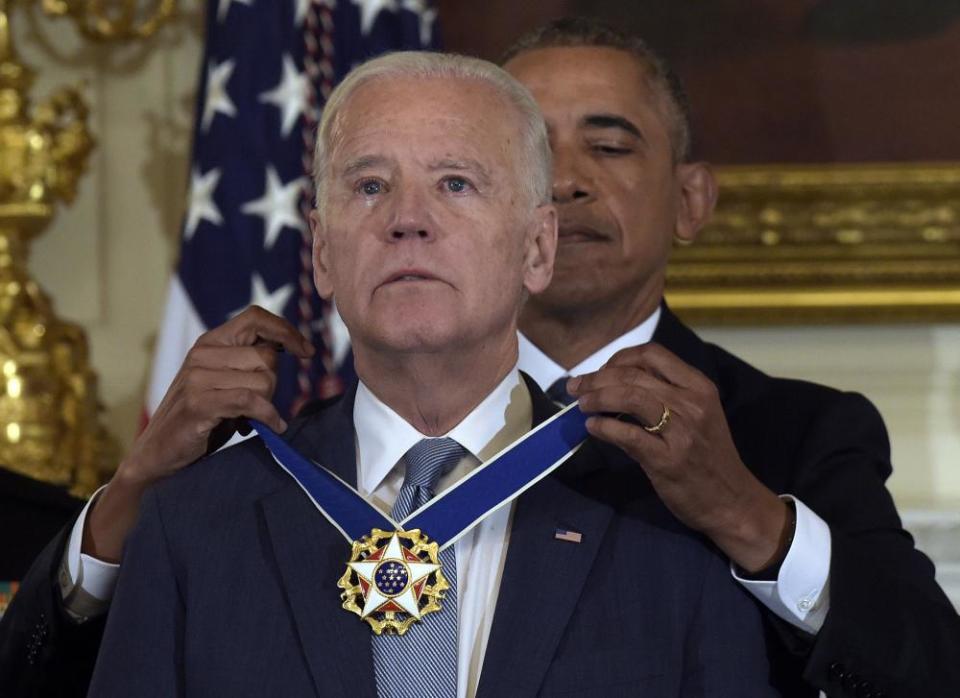Joe Biden: the liberal everyman spoiling for a fight with Trump as 2020 looms
The Democratic field is likely to be swollen but the 75-year-old could represent a likable consensus candidate for both wings of the party

Among recent pilgrims to the Arizona ranch of Senator John McCain was Joe Biden. The Republican, who has an aggressive form of brain cancer, urged the former vice-president to “not walk away” from politics, Biden told the New York Times. It did not take much imagination to see this as a metaphorical shove – into the next race for the White House.
Biden has the desire, the pedigree – and the rage. On Friday, incensed by reports that a White House aide had dismissed McCain with the terse comment “he’s dying anyway”, the 75-year-old Democrat let rip, declaring that decency in the administration had finally hit “rock bottom”.
It was just the latest evidence that Biden is spoiling for a fight with Donald Trump. Whereas Barack Obama has maintained a zen-like calm even as his legacy is eviscerated, Biden has taken the gloves off, hammering the president’s policies and personal conduct, even suggesting that he would like to “beat the hell out of” Trump over his crude remarks about women.
But in 2020 he would be up against the most competitive and crowded Democratic field in many years. The point will be brought home on Tuesday, when the Center for American Progress in Washington hosts potential contenders including senators Cory Booker, Sherrod Brown, Kirsten Gillibrand, Amy Klobuchar, Chris Murphy, Bernie Sanders and Elizabeth Warren, as well as the former housing secretary Julián Castro and New York mayor Bill de Blasio.
Bill Galston, a former policy adviser to Bill Clinton, said: “There are three lanes to look at. In lane one, there is ‘Bernie-lite’, which could be Bernie himself. In lane two, there are people who think, for a variety of reasons, that’s not the right way for the Democratic party to go and we ought to be 21st-century reformers.
If people are looking for a unifier and don’t want to shed internecine blood, the argument for Biden could be potent
Bill Galston, former Clinton adviser
“Lane three is the Biden lane. He’s really sui generis. If people are looking for a unifier and don’t want to shed internecine blood, the argument for Biden could be potent. On the other hand, he has always underperformed as a presidential candidate in the past.”
Biden made unsuccessful bids for the presidency in 1988 and 2008. He did not run in 2016 after the death of his son Beau. But he has repeatedly not ruled out a shot at 2020. He published a book, Promise Me, Dad, and has been travelling the country, a tour extended beyond its original schedule. This week, at an event organised by his own foundation and the Brookings Institution, he expressed indignation at the plight of the middle class, offered a preview of a nascent manifesto and frequently veered off script for dramatic effect.
“I love Bernie but I’m not Bernie Sanders,” he said. “I don’t think 500 billionaires are the reason why we’re in trouble … We have not seen this huge concentration of wealth. The folks at the top aren’t bad guys. I get in trouble in my party when I say wealthy Americans are just as patriotic as poor folks. I’ve found no distinction, I really haven’t.”
But then, in what some might find a contradiction, he went on: “This gap is yawning. It’s gaping and it’s having the effect of pulling us apart. You see the politics of it. And the country’s not going to stand for it forever so we have to deal with the tax code. It’s wildly skewed toward taking care of those at the very top. It overwhelmingly favours investors over workers and it’s riddled with unproductive expenditures.”
The paradoxical comments illustrated Biden’s dilemma – or opportunity. On the one hand, he is a centrist and having spent 36 years as a senator and eight years as vice-president can hardly be described as an outsider. On the other, he has faced criticism over links to the financial services industry, a major presence in his home state, Delaware.
A New York Times report three years ago noted that Biden supported a bill in 2005 that would have made it more difficult for consumers to seek bankruptcy protection. Obama voted against it. Executives and employees of the credit card issuer MBNA contributed roughly $200,000 to Biden campaigns from 1989 to 2010, the paper said. Warren was among those who called him out on it.
Still, as Democrats tack left on issues such as healthcare, Biden may seek to tap into the economic populism that propelled Sanders to run Hillary Clinton close in 2016. Many pundits have speculated that straight-talking Biden would have done better than Clinton at appealing to blue-collar voters and neutralising Trump in the ultimately decisive states of Michigan, Pennsylvania and Wisconsin.
In his speech at Brookings, there was a glimpse of how Biden might attempt to play both sides. “If you listen to Barack, you’d think I climbed out of a coalmine with a lunch bucket from Scranton in my hand,” he said of his Pennsylvania origins, prompting laughter. “It’s not true.” His father was “a white-collar worker, a salesperson”, he said, who moved the family in search of greener pastures.
Biden portrayed himself as an everyman. He said his own three children each graduated from university with six-figure debts despite working 30 hours a week and financial support from their parents. He distanced himself from political action committees and the curse of money in politics.

“You may remember,” he said, “that when I filed my financial disclosure as vice-president the front page of the Washington Post said it’s probable no man has ever assumed the office of vice-president with fewer assets than Joe Biden.
“My net worth was between $50-150,000. When I left [public office] after 44 years it was still between $50,000-150,000 because I said I’d never own a stock or bond for fear of conflict, I would never engage in a business enterprise, even those that were legal and appropriate, and I would never accept an honorarium. So I got the dubious distinction but I also had absolute independence my whole career.”
His policies offer a blend of pragmatism and progressivism. He proposed fixing the tax code so that it no longer favours investors over workers and free community college funded by eliminating the stepped-up basis tax expenditure that allows heirs to reduce the capital gains taxes they pay on inherited assets.
“Every state university should be free,” he said, in an echo of Sanders. “We can afford it.”
I’d be really surprised if he didn’t go for it this time. This is his last chance
Henry Olsen, Ethics and Public Policy Center
Biden demanded the removal of workers’ barriers to fair pay – “Give me an economic reason why a sandwich maker has to sign a non-compete clause” – a massive infrastructure rebuilding programme – “I got in trouble as vice-president when I landed in La Guardia and I said this is a third-world airport” – and a scheme that would encourage investment in innovation and entrepreneurship beyond the usual major cities.
There was also an audition for the role of candidate willing to go toe to toe with Trump. “There has been such a fertile ground for this phony populism that we are living through now, and it is a phony populism as my friend John McCain would say,” said Biden, earthy and pugnacious. “It’s all about making room for the abuse of power.”
‘The audacity of grope’
For all the efforts at triangulation, and his liberal credentials on abortion and gay marriage, the former vice-president has counts against him. They include his age, his Clinton-like association with the party establishment and copious video footage of him touching women, dubbed “the audacity of grope” by Comedy Central’s The Daily Show – hardly a message the party wants to promote, even if Trump has been accused of worse.
Henry Olsen, a senior fellow at the Ethics and Public Policy Center and author of The Working Class Republican, said: “We’re in the MeToo era. He has a reputation for being more tactile than is socially appropriate. There is energy in the feminist wing of the Democratic party and part of that is driven by the sexual misconduct allegations against Trump.”
Olsen added: “Joe Biden has wanted to be president for decades. I’d be really surprised if he didn’t go for it this time. This is his last chance. In the polls last time, he was clearly drawing from the right of the Democratic party. That isn’t going to change. The hardline progressive isn’t going to say, ‘Joe’s our man.’ That means he has the weaker hand.”
Biden may have to jostle for position with Kamala Harris, Sanders and other senators, former attorney general Eric Holder, ex-Virginia governor Terry McAuliffe, former New Orleans mayor Mitch Landrieu and Los Angeles mayor Eric Garcetti. Even so, Bob Shrum, a Democratic strategist and senior adviser to past presidential campaigns, said: “The most likely person, in my view, is Joe Biden. He has the broadest support in the party. He can speak across the constituencies and he’s well liked. That’s important.”

